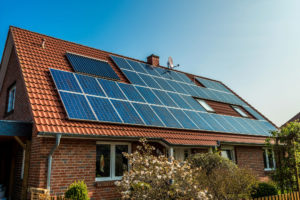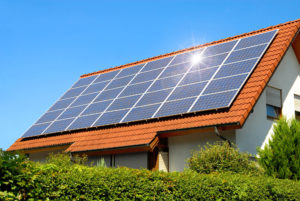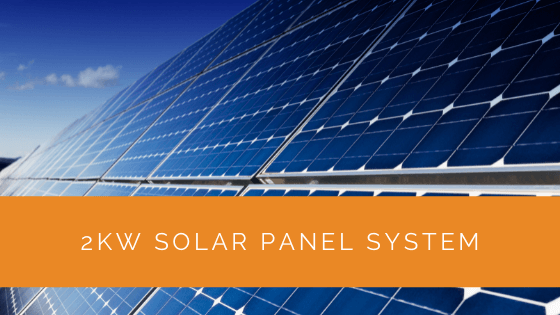As the world aims to reduce its carbon footprint, the ideal way to reduce our daily carbon emissions is by using solar products for our daily chores.
You don’t need a super expensive solar PV system to replace conventional energy with solar energy in your home. You only need an economic 2kW solar panel system to make your house more eco-friendly.
This article will provide all the information you need about 2kW solar panels in the UK.
Contents
- 1 Key Takeaways
- 2 What are 2kW Solar Panels?
- 3 Cost of a 2kW Solar Panel Setup
- 4 Getting Optimum Returns From Your Solar Panels System
- 5 How To Maximise the Efficiency of your 2kW Solar Panel System?
- 6 How To Get a 2kW Solar Panel System?
- 7 Case Study: Installation and Benefits of a 2kW Solar Panel System
- 8 Expert Insights From Our Solar Panel Installers About 2kW Solar Panel Systems
- 9 Other Solar Panel System Sizes
- 10 Discover the Power of Solar with Solar Panels Network
- 11 Final Words
Key Takeaways
- A 2kW solar panel system is a cost-effective way to power a small home and reduce carbon emissions.
- The cost of a 2kW solar panel set up in the UK is approximately £4,000, considering factors like roof area and hindrances.
- To maximise the efficiency of a 2kW solar panel system, consider factors like panel quality, avoiding shaded areas, hiring expert installers, and regular panel cleaning.
What are 2kW Solar Panels?
When you think of solar panels, you think of gigantic panels installed on your rooftops. However, a small, compact 2kW panel is good enough to power a house with 1-3 people.
The basic framework of a 2kW solar panel system remains the same as that of a conventional system. Every system consists of several solar panels. These solar cells can be grouped to gather light and generate usable electricity.
Here’s where the difference comes in. The output rate of 2kW solar panel systems differs from that of other, bigger systems. The electricity generated per year by these solar panel systems is around 1.88kW.

Cost of a 2kW Solar Panel Setup
A regular 2kW system requires 14m2 of roof area. This brings in a cost of around £3,250. However, you would have to consult with a professional installer to get the final cost for your system.
The installer will consider the area of your rooftop and possible hindrances. Keeping around £4,000 aside for a 2kW Solar Panel is safe as a rough figure.
Getting Optimum Returns From Your Solar Panels System
Even though the investment incurred in a 2kW system is much less than a conventional system, it is still substantial. Therefore, you would want to notice some substantial returns for your investment. To ensure this, you must ensure that MCS accredits your system installer.
An MCS-accredited installed system will enable you to seek benefits through the FIT scheme. This scheme rewards you for the extra energy you sell to the national circuit.
Here are a few facts that will help you better understand your returns on investment.
- The payback period of a 2kW solar panel system is 7.5 years. This is very short compared to other systems.
- You will be making consistent profit above your investment post the payback period.
- A 2kW solar panel system installed by an MCS-certified supplier will earn you 4.11p per kWh of energy generated. You are also given an export tariff of 4.77p per kWh.
- Additionally, FIT guaranteed you around 4.11p/ kWh more on top of everything.
How To Maximise the Efficiency of your 2kW Solar Panel System?
Your geographical location and the angling of your roof heavily influence the performance of your solar panel system. A professional installer would determine the best position for installing the system.
It is crucial to remember that restrictions like building shading over your roof and trees might affect your system’s performance. Keeping all these points in consideration, here are five ways to improve the efficiency of your solar panel system.
Buy The Most Efficient Solar Panel Model Available
Solar panels are made up of photovoltaic cells. These cells convert solar energy into electrical energy. However, a solar panel can not convert all its solar energy into usable electrical energy.
Therefore, a solar panel system’s efficiency is the percentage of solar energy converted into electricity. Try to find the best solar panel system available in the market based on the material and structure of the model.
Look for Panels That Provide High Concentrated Photovoltaic Cells
The purpose of CPV is primarily to concentrate sunlight on highly efficient solar cells. A conventional solar panel peeks at around 21% efficiency. However, the cells provided in CPV panels can reach up to 43% efficiency.
However, this increased efficiency comes with a raised price. CPV panels cost around four times more than a traditional solar panel system. It would be best if you checked the quotes of different manufacturers to get yourself the best deal.
Don’t Install Your Panels in a Shaded Area
The sole input of a solar panel is sunlight, and shade blocks sunlight. Therefore, keeping your system away from shaded areas is only logical.
The total energy efficiency can be reduced even if one solar cell is guarded against sunlight because it performs as a resistor. Two of the most common barriers that often shade solar panels include tall buildings and trees.
It is empirical to be judicious during planning and ensure shade isn’t an impediment.

Resort To Only Expert Installers
It might not be good to consider saving installation costs by approaching a non-certified local installer. If solar panels aren’t installed optimally, they won’t get proper sunlight and will produce less electricity.
Here are some of the factors you should stress while getting your system installed:
- Solar panels should be at an angle of 18 to 36 degrees to maximise sunlight exposure.
- Since the UK is in the northern hemisphere, your solar panels should be oriented towards the south.
- The efficiency of solar panels can decrease as the temperature rises.
- A sufficient gap should be left between the solar panels and the roof during installation.
Investing in an expert installer and qualified electrician is best to get the maximum benefit out of your system, with so many factors to consider.
Clean Your Solar Panels Regularly
Your system wouldn’t require much maintenance since there are no moving parts. However, the accumulated dust and grime over the surface of the panels can reduce the system’s efficiency. Therefore, treating your solar panel system with regular cleaning would be best.
No fixed number for how often you should clean your solar panels in a year. Factors like the frequency of rain and the cost of one cleaning session can determine how often you want to clean your system.
In one year, dust and dirt are expected to cause a decline of 5% in the total output. However, the reduction can go up to 20% in areas with scarce rainfall. Therefore, cleaning your panel once every year is a pretty ideal thumb rule.
How To Get a 2kW Solar Panel System?
Now that you know everything there is to know about 2kW solar panel systems, it is time to get one for your house. You would be happy to know you can install your system without much hassle in the UK.
There are several certified installers that you can approach. You can start the process while sitting in the comfort of your home.
To get started, you can follow these easy steps to get a quote for your solar panel installation.
- Step 1: Go to the installer’s website and describe your requirement for the product by filling out a form.
- Step 2: The installer will connect you with manufacturers and suppliers based on your demand and geographical location.
- Step 3: You will receive quotes from multiple suppliers based on your requirements.
- Step 4: Analyse all the quotes to select the most viable supplier and complete the installation process.
Case Study: Installation and Benefits of a 2kW Solar Panel System
Background
A small family in a suburban UK area sought to reduce their carbon footprint and lower their energy bills. They decided to invest in a 2kW solar panel system, which seemed ideal for their energy needs and budget.
Project Overview
The project aimed to install a cost-effective solar energy system that could provide enough power to cover the household’s basic energy requirements. The family chose a 2kW system due to its affordability and sufficient capacity for their modest energy consumption.
Implementation
- Site Assessment and Planning: An MCS-accredited installer conducted a comprehensive site assessment, ensuring that the roof area was suitable for solar panel installation. The site had no significant shading, and the roof’s angle was ideal for maximum solar exposure.
- System Selection and Installation: The family selected high-efficiency monocrystalline panels to maximise energy production. The panels were installed at an optimal angle, facing south to capture the most sunlight. The installation process included setting up a solar inverter and connecting the system to the household’s electrical grid.
- Connection and Monitoring: The system was connected to the national grid, and a smart meter was installed to monitor energy production and consumption. This setup allowed the family to track their energy savings and any surplus energy exported to the grid.
Results
- Energy Savings: The 2kW solar panel system consistently generated approximately 1,900 kWh annually, covering a significant portion of the household’s energy needs. This resulted in substantial savings on electricity bills.
- Environmental Impact: By switching to solar energy, the family reduced their carbon footprint by approximately 1 tonne of CO2 annually. This contribution supported broader efforts to combat climate change.
- Financial Returns: The system’s installation qualified the family for the Feed-in Tariff (FIT) and export tariff, earning them additional income from the excess energy sold back to the grid. The payback period for the system was calculated at around 7 years, with the family expected to see consistent returns beyond this period.
Summary
The installation of a 2kW solar panel system proved to be a valuable investment for the family, offering both environmental and financial benefits. The project highlighted the feasibility of small-scale solar installations for homeowners seeking sustainable and economical energy solutions. As a result, the family not only reduced their reliance on non-renewable energy sources but also contributed positively to environmental conservation efforts.
Expert Insights From Our Solar Panel Installers About 2kW Solar Panel Systems
A 2kW solar panel system is an excellent choice for small households looking to reduce their carbon footprint and energy bills without a significant initial investment.
Senior Solar Installation Specialist
Maximising the efficiency of a 2kW system involves careful consideration of panel placement and quality. Even a small system can yield significant energy savings with proper installation.
Renewable Energy Consultant
The affordability of 2kW systems, combined with available incentives, makes them a viable option for many homeowners. It’s a practical step toward sustainable living.
Solar Energy Advisor
Other Solar Panel System Sizes
- 1kW Solar Panel System
- 3kW Solar Panel System
- 4kW Solar Panel System
- 5kW Solar Panel System
- 6kW Solar Panel System
- 12kW Solar Panel System
Discover the Power of Solar with Solar Panels Network
Are you navigating the world of solar installations? Look no further than Solar Panels Network, the UK’s trusted partner in harnessing the sun’s potential. Our dedication goes beyond just installations; we’re on a mission to transform how homeowners and businesses across the UK perceive and utilise energy. By choosing us, you’re reducing your carbon footprint and making a smart financial move that promises savings for years ahead. Contact us today and embark on your solar journey.
Final Words
The solar capacity in the UK has increased from 5,488 MW to 13,259 MW in the last five years. This shows how the country is taking giant leaps towards shifting to renewable energy. Options like 2kW solar panel systems allow you to contribute to this movement from home.
2kW solar panel systems provide sustained energy and open doors for intelligent saving and profit-making.
About the Author
Solar Panels Network stands at the forefront of solar energy solutions, driven by a team of seasoned solar engineers and energy consultants. With over decades of experience in delivering high-quality solar installations and maintenance, we are committed to promoting sustainable energy through customer-centric, tailored solutions. Our articles reflect this commitment, crafted collaboratively by experts to provide accurate, up-to-date insights into solar technology, ensuring our readers are well-informed and empowered in their solar energy decisions.

